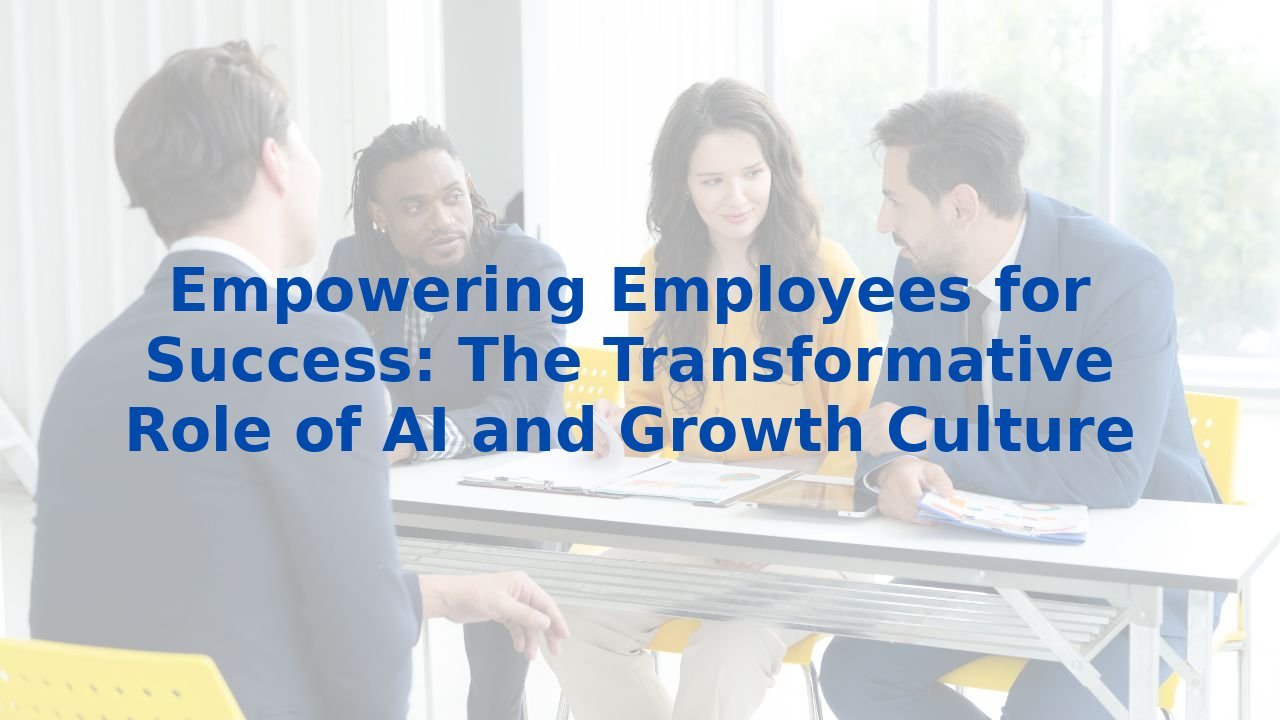Empowering Employees for Success: The Transformative Role of AI and Growth Culture
Resonant and Purposeful: Empowering Employees for Success
In today's dynamic marketplace, especially within our industry, it's essential to acknowledge that many jobs serve as stepping stones toward greater opportunities. As an HR advocate, my goal transcends mere employee retention; I aim to equip my team with the skills they need to flourish, not just within our organization, but in their future endeavors. This might seem counter-intuitive—training employees to potentially leave—but what if the real objective is to create a wave of engagement that benefits everyone involved? What if, by investing in our people, we empower them to be a blessing to others as they progress in their careers?
Building a Culture of Growth
To foster a workplace culture rooted in growth and development, we can take inspiration from the ethos of mentorship and guidance. In many ways, it's about passing the baton and nurturing the next generation of leaders. We are cultivating what could be termed 'Timothys'—individuals who are not only well-equipped for their roles but are also grounded in values that inspire others. This approach builds a strong community and amplifies the positive impact on the team, even when employees transition to new roles.
The Role of AI in Employee Development
This is where the integration of Artificial Intelligence (AI) becomes a game changer. AI technology can assist in shaping tailored training programs that cater to individual learning styles and career trajectories. Imagine a world where every employee has access to personalized learning paths designed to enhance their unique strengths and address growth areas.
AI analyzes vast amounts of data to identify strengths and weaknesses, allowing managers to curate training experiences that optimize individual potential. With machine learning algorithms, we can determine the most effective training methods—whether through video tutorials, hands-on workshops, or peer-to-peer training—ensuring that every employee receives the support they need.
Streamlining Training Processes
Beyond personalization, AI can streamline entire training processes. Chatbots can answer common employee queries about their development, offer feedback on courses taken, and connect them with relevant resources—all in real time. This efficiency frees up HR professionals to focus on higher-level strategy and relationship-building within the organization.
Additionally, AI-driven platforms can monitor employee progress and engagement levels. By tracking performance and engagement, HR advocates can intervene when necessary, providing extra support or resources to those who may feel stuck. This proactive approach ensures that no employee falls through the cracks, ultimately contributing to a more empowered workforce.
Fostering Soft Skills and Emotional Intelligence
While technical skills are vital in our fast-paced world, soft skills and emotional intelligence are equally important. AI can help in assessing and evaluating these skills through innovative simulations and AI-driven feedback loops. For example, leaders can use AI to evaluate team dynamics, providing insights into how employees can better collaborate and support one another, leading to a culture of collective enhancement.
Through focused training sessions facilitated by AI analytics, employees can gain critical skills like adaptability, communication, and teamwork. These competencies prepare them for the next stage of their careers while also instilling a sense of responsibility towards their peers and future colleagues.
An Ecosystem of Blessings
When we take the time to develop our employees—teaching them not only to excel in their current roles but also to thrive in their future positions—we create an ecosystem of blessings. Each employee who leaves our organization equipped with knowledge, skills, and a positive mindset becomes a conduit for change in their new roles.
Our drive for cultivating Timothy’s—those who uplift and empower others—can transform how industries operate. It’s not merely about filling positions but about crafting a community that recognizes the importance of mentoring and growth.
Conclusion: Investing in Future Leaders
As we embrace AI as a tool for workforce development, we not only make our training programs more efficient, but we also nurture a more engaged and confident workforce. By viewing our employees as future leaders, and equipping them with essential skills, we’re paving the way for profound changes within and beyond our organization.
This approach may challenge the norms of traditional HR practices, but it’s high time we embrace the future with a resonant and purposeful strategy. Strengthening our employees’ journeys not only benefits them; it enriches our entire community and industry. Together, let’s invest in the success of our people and witness the waves of positive change ripple through the marketplace!



